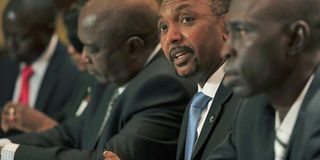Central African Republic mediators defend Nairobi talks

Moustapha Saboune (centre), a former Seleka militia member from the Central African Republic, speaks at a press conference in Nairobi, on January 30, 2015. Next to him are Mukom Gawaka (right) and Abel Belenguele. FILE PHOTO | SIMON MAINA |
What you need to know:
- Marende says by engaging only the combatants, the negotiations can end the violence.
Envoys charged with spearheading peace in the Central African Republic are defending a decision to involve only two sides in the conflict in talks being held in Nairobi.
At a press conference in Nairobi, Kenneth Marende, the Chief Mediator of the Nairobi Central African Republic Peace Initiative, said they were first targeting the main combatants in the conflict.
"The task that we were charged with in Nairobi was to, through mediation, endeavour to secure sustainable peace for the CAR. Our first checkpoint is to see how best we can end the violence in the Central African Republic," Mr Marende told journalists.
"The logical place to begin therefore was to bring the combatants to the table to engage in negotiation and see if they can agree to a ceasefire. We have been able to achieve that."
Mr Marende, a former Speaker of the Kenyan National Assembly, was addressing journalists together with Albino Aboug, a special envoy of the International Mediator to the CAR conflict, Congolese President Denis Sassou Nguesso.
Mr Marende has since December last year been mediating between the main actors; anti-Balaka rebels who are mainly Christians and the ex-Seleka rebels composed mainly of Muslims.
Representatives of the two groups have been in Nairobi since December when Mr Marende's team that also included Lt-Gen (Rtd) Njuki Mwaniki was formed by President Uhuru Kenyatta, upon the request from his Congolese counterpart.
But even as Kenya moved to create the team, there has been criticism that it excludes other participants who should be part of a solution.
These include the representatives of the transitional government in Bangui, religious groups, civil society and political parties.
"We are awake to that reality that we need a more inclusive process to secure sustainable peace," Mr Marende said.
"We are not excluding other people. Freedom will be useful to everybody. So if we can find a solution between the two stakeholders, what is wrong with that?" posed Mr Aboug, a South Sudanese-American dual-national, himself a former Sudan People's Liberation Army child soldier.
EXPECTED TO SIGN CEASEFIRE
The envoys argued the mediation has the blessing of the UN and the AU and that the two sides are expected to formally sign a ceasefire agreement next week "in the presence of the international community".
The Central African Republic hasn't known peace for the last decade and there have been coups and coup attempts at least every two years since 1990.
The latest unrest in the CAR began in March 2013 when the mainly Muslim Seleka rebel coalition toppled the ruling regime of Francois Bozize and put Michel Djotodia — the country's first Muslim leader — in power.
Mr Bozize himself came to power through a coup. But in January 2014, Mr Djotodia quit office as interim president but the violence continued.
The country elected another interim president, Catherine Samba-Panza, but CAR remained suspended from attending AU meetings.
The two sides had previously signed ceasefire agreement in the Congolese capital overseen by Mr Nguesso but would later violate it.
They had been meeting there to reach a deal that would lead to the total disarmament of rebels.
The violence has led to the displacement of at least 438,000 people within the country and forced more than 423,000 people to flee to Cameroon, Chad, the Democratic Republic of Congo and the Republic of Congo, according to the UN Office for the Coordination of Humanitarian Affairs (OCHA).
Thousands more have been killed in the religiously-motivated violence.




